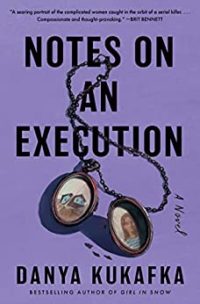 Title: Notes on an Execution by Danya Kukafka
Title: Notes on an Execution by Danya Kukafka
Publisher: William Morrow
Genre: Contemporary, Fiction
Length: 316 pages
Book Rating: B
Complimentary Review Copy Provided by Publisher Through Edelweiss
Summary:
In the tradition of Long Bright River and The Mars Room, a gripping and atmospheric work of literary suspense that deconstructs the story of a serial killer on death row, told primarily through the eyes of the women in his life—from the bestselling author of Girl in Snow.
Ansel Packer is scheduled to die in twelve hours. He knows what he’s done, and now awaits execution, the same chilling fate he forced on those girls, years ago. But Ansel doesn’t want to die; he wants to be celebrated, understood.
Through a kaleidoscope of women—a mother, a sister, a homicide detective—we learn the story of Ansel’s life. We meet his mother, Lavender, a seventeen-year-old girl pushed to desperation; Hazel, twin sister to Ansel’s wife, inseparable since birth, forced to watch helplessly as her sister’s relationship threatens to devour them all; and finally, Saffy, the detective hot on his trail, who has devoted herself to bringing bad men to justice but struggles to see her own life clearly. As the clock ticks down, these three women sift through the choices that culminate in tragedy, exploring the rippling fissures that such destruction inevitably leaves in its wake.
Blending breathtaking suspense with astonishing empathy, Notes on an Execution presents a chilling portrait of womanhood as it simultaneously unravels the familiar narrative of the American serial killer, interrogating our system of justice and our cultural obsession with crime stories, asking readers to consider the false promise of looking for meaning in the psyches of violent men.
Review:
Notes on an Execution by Danya Kukafka is a bleak yet incredibly fascinating novel.
Ansel Packer is a serial killer whose execution is twelve hours away. As time ticks down, he has plans to thwart his fate. He is good-looking and charming but there is a darkness underneath the façade he presents to the world. Ansel knows he is different and he has carefully studied other people and he knows how he is supposed to react in most situations. But has Ansel managed to fool everyone whose path he has crossed?
Lavender is Ansel’s mother whose decisions as a teenager turned out very differently than expected. Moving in with her boyfriend, she is isolated and frightened by the man she lives with. Ansel is their first child and Lavender tries her best to protect him from his father’s violence. When she gives birth to their second child, Lavender makes the best decision she can for herself and her children.
Hazel is Ansel’s sister-in-law and she does not understand what her intelligent, beautiful twin sister, Jenny, sees in him. Ansel’s grand gesture at the family’s first meeting sets Jenny’s future with him. Hazel and Jenny are very different yet growing up, they are very close. As their lives diverge in adulthood, Hazel witnesses her vibrant sister slip away after her marriage. Is there any chance she can save her sister from Ansel?
Homicide Detective Saffron “Saffy” Singh is obsessed with the three murders committed by Packer. Over the course of several years, she revisits the still unsolved case although she is certain she knows that Ansel is their killer. Saffy has unique insight into Packer but she is unable to find evidence to link him to the killings. She refuses to give up on finding justice for his victims but a decision Saffy makes will eventually come to haunt her.
Notes on an Execution is a reflective novel with a unique storyline. The characters are well-drawn but not all of them are relatable or easy to like. The narration rotates between four distinct perspectives that add depth to the storyline. Danya Kukafka brings this atmospheric novel to a satisfying conclusion.

